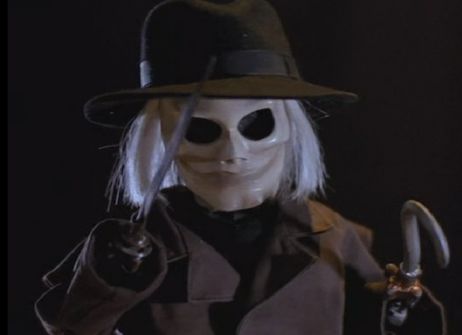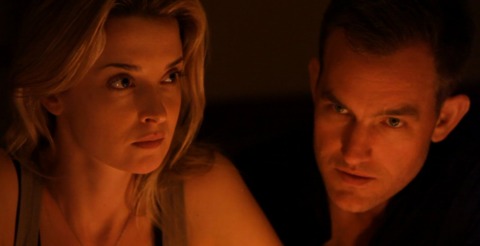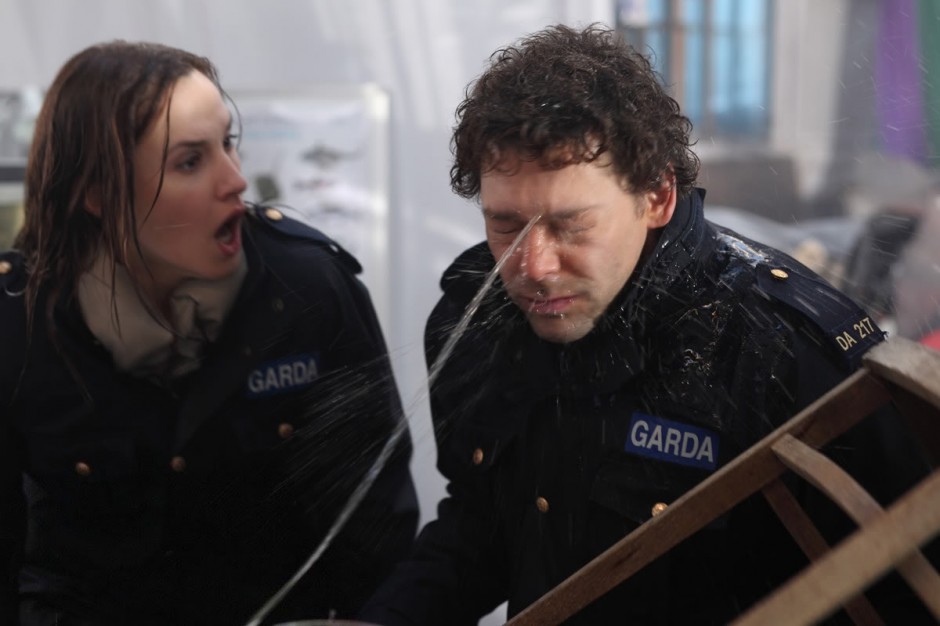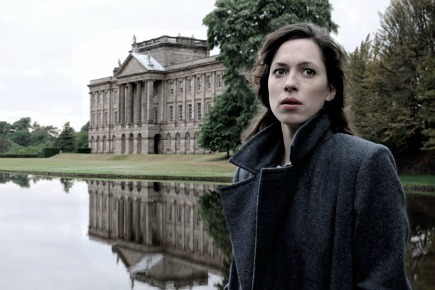
Another week, another slate of horror movies. When I started looking over my notes from the last seven days, I was legitimately impressed with how much I managed to sneak in. It's a good thing, too, since I haven't been able to watch any movies this week, and my time is scarce in the days ahead, thanks to a wedding. (It'll be fun, but c'mon, I have movies to watch!)
What makes the movies from this past week so interesting is how they cross over into different genres. Genres are a weird thing to begin with. On every service, you'll see movies divided into horror and thriller, though it's easy to see the films in either. A perusal of Netflix's offerings confirms this. Is anyone going to say Rosemary's Baby, You're Next, and Silent House aren't horror movies? It's a weird line to draw.
Coherence (2014) by James Ward Brykit
The vast majority of horror spends way too much time fellating its clever or harrowing premise, and forgets the reason to care about said premise are characters worth a damn. You see better characters in low-budget flicks, since they can't compete on the CG stage. Coherence is a movie about characters who just-so-happen to exist in terrifying world where a comet is causing lots of weird stuff to happen.
A group of friends are getting together for dinner, and it feels like an annual event where everyone goes out of their way to attend because it goes back decades. It's a dinner where old tensions flare, but everyone shuts up and has another drink. In any other circumstance, it would end with someone driving home after a little too much wine, a reminder why they only do this once a year, and life goes on. But not this time.

Like Honeymoon, Coherence spends an extraordinary amount of time placing its chess pieces. We know stuff has to get wild at some point, and Coherence smartly seeds what's to come relatively early, but shows patience. In the first 20 minutes, we're introduced to the major players, and provided history lessons on what's happened before they all walked into the room.
Besides making the characters more than fodder for what lurks in the dark, it helps movies skirt a major issue. For a horror movie to work, the characters have to make careless decisions--separating from the group, walking in the dark, etc. What makes these decisions frustrating is the lack of motivation. It usually comes across as a way of moving the plot or setting up some quick death, rather than a consequence of the events at hand. The characters in Coherence do some very stupid things that would seem obvious in retrospect, but in the moment, when nothing makes sense, you can understand how they got there.
Also like Honeymoon, it's impossible to talk about Coherence without giving away what's going on, but it's a wonderful and horrifying thought experiment. Coherence really commits to its ending, too, in a way other horror movies don't. Cliffhangers are commonplace, but largely because it's setting up a sequel for a movie hoping to become a franchise. Cliffhangers can be effective if done with purpose. When the credits roll, it's a gut punch "oh shit" moment that leaves your mind reeling about what happens in the minutes after. What actually happened next isn't important so much as what the cliffhanger implies about the moment itself.
Yeah, I really liked Coherence.
Grabbers (2012) by Jon Wright
When JJ Abrams made Super 8, he spoke fondly about Steven Spielberg. Spielberg directed E.T. and Close Encounters of the Third Kind, but was also responsible for bringing Gremlins, The Goonies, and others to life as a producer. These films had a particular mixture of heart, hope, and fear. It's made them feel authentic, a sentiment Abrams failed to capture in Super 8, perhaps because he was trying too hard.
That's the long way of saying Grabbers pulls this off, a movie that could easily fall into Amblin's lineup, if you were to swap Grabbers' computer effects for rubber puppets. A small Irish town is forced to grapple with the sudden appearance of creatures from the sea that subsist on sucking the blood from their victims. One of the town's few police officers is an alcoholic, but gets away with it because everyone else is, too, and there's never any crime. When a feisty out-of-towner (a women, naturally) shows up to temporarily take the chief of police's place, the two are quickly thrust into a situation where they have to work together.

Let me cut to the chase, and the reason you should watch this: the police discover alcohol can kill the critters. The plan? Get the whole town piss drunk, so if anyone happens to get their blood sucked, it'll also kill the things. It's not hard to imagine how this leads to some pretty ridiculous situations, especially given this is a town full of people who are well-versed in getting piss drunk on a daily basis. They're experts.
It's really fun, straddling the Spielbergian line of making you laugh and scream in equal measure, a movie that takes itself seriously enough to not take itself too seriously. The only measure by which Grabbers falls apart is its insistence in shoehorning a romantic arc between the two leads. There's barely enough time to become friends, let alone lovers. There's nothing about the story that demands the two ride off into the sunset together, hand-in-hand, yet the movie forces the issue at the exact point the characters should be worried about anything but. People are being killed left and right, monsters are getting bigger by the minute, but hey, let's kiss? It feels heavy handed, forced, and totally unearned. Fortunately, it's irrelevant.
The Houses October Built (2014) by Bobby Roe
Man, does this movie sound good on paper. A group of thrillseekers rent an RV each year, hitting up haunted houses and documenting their journey. They hear whispers online about the haunted house, and start seeking it out. It's a solid setup for a found footage film, especially for a genre that often doesn't bother having a decent narrative conceit to explain why everyone is running around with video cameras.
The trailer is really good, too! Gosh, I was psyched for this one. When the doll girl suddenly starts screaming in the RV? Chills! But The Houses October Built is a movie whose best scares are tucked into the trailer. This isn't a case where a trailer ruins tension and buildup, but exposes how little there is to The Houses October Built. Everything's in the trailer because there's nothing else for the movie to present.
There's not much to say. It's boring, it's not scary, and the trailer is better than the movie itself.
(P.S. What kind of haunted house would let you film what happens inside? Ugh.)
Dead Snow 2 (2014) by Tommy Wirkola
Here was the first question I had about Dead Snow 2: what is that guy from Party Down doing here? Somehow, Martin Starr signed up for this. Then again, I'd probably say yes if someone called me up and said "hey, do you wanna fly to Norway and pretend to kill zombies for a few months?

Even though I watched Dead Snow some years back, I can't remember much about it. The zombie nazis were a cute twist on an overdone concept, but it didn't leave a lasting impression. It was fine for a boring night.
Don't take this as a comparison of quality, but if Dead Snow was Evil Dead, Dead Snow 2 is Evil Dead 2. Sam Raimi's series pivoted from straight horror to horror comedy in the sequel, and Dead Snow 2 finds similar success with the format. There are a few shocking moments in Dead Snow 2, but they're often derived from violent absurdity, rather than "hey, time to gross you out." (Though Dead Snow 2 does have those moments too often, and it's the movie at its weakest.)
Don't try to apply logic to what happens in Dead Snow 2. How does the human body just organically embrace the arm of a dead person? Shouldn't the cops call someone? Just embrace the contradictions.
In a month that's been full of nightmares, Dead Snow 2 gave me some hearty laughs. It's a movie willing to embrace its cheese, and when it discovers the best running gag I've seen in a movie all year, I started to fall in love. You'll know what I'm talking about it when you see it, and be sad when it comes to an end.
The Awakening (2012) by Nick Murphy
I've had The Awakening kicking around my Shocktober lineups for a while now, but never pulled the trigger because the trailer didn't sell me on anything but another timid ghost story that's been done endlessly. Having finally watched The Awakening, I can assure you it's much more than its trailer lets on.
Set during the depressing aftermath of World War I, Florence Cathcart's made a name for herself by debunking supernatural myths. She's riding high off the success of a book denouncing the existence of ghosts when a man knocks at her door, pleading for someone to investigate a haunting at school for young boys. Things quickly begin to go bump in the night, but it's unclear whether it's actually ghosts.

What makes Cathcart more interesting than your typical ghost investigator is that she does so totally biased against the concept. The Conjuring, Insidious, and other recent ghost tales involve people who believe in the supernatural, and who arrive in your home to help prove it to you, as well. Cathcart investigates the supernatural because she's not convinced, and every claim she's able to debunk becomes another notch in her belt, and only emboldens her ultimate cause.
The story's more complicated than that, but the less you know, the better. The Awakening doesn't make sense until its final moments, but it's earned.
The way horror movie sells and distribute tension varies wildly. Some try to keep you on the edge of your seat the whole way through, while others pick and choose their moments, using surprise as its primary tool. Remarkably, once The Awakening passes a certain moment in the story, it does both, which is how it remains consistently effective. Too often, surprise is just another way of saying jump scare, and while The Awakening, being a ghost story, has jump-y moments, it's not exploitative and lazy like so many others.
I'd argue The Awakening is less scary than it is tense. In many ways, that's worse. Scares are a form of relief, and when the "scare" happens, it usually means a moment to regain composure, as the movie's beats begin to alternate. Tension is ongoing, fostering a lingering sense of dread. You're always nervous.
It's a ghost story that's not about the ghosts. What makes The Awakening work is Cathcart's psychological journey, and what happens along the way is only important because it's important to Cathcart. The audience getting scared is a lovely byproduct, of course, but it's all in service of a good story.